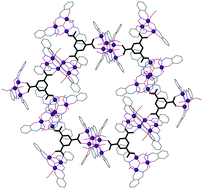Single Molecule Magnets (SMMs) are transition metal clusters that show superparamagnetic behavior below the blocking temperature. The advantage of SMMs over other traditional magnets is that they can be soluble in organic solvents, can form crystalline structures and have a uniform size. It is also possible to modify their magnetic properties by altering the organic ligands surrounding the transition metal clusters. SMMs have potential applications in quantum computing and information storage.
Giannis Papaefstathiou et al have synthesized two new coordination polymers. They are both built from [Mn6] clusters and trimesate anions. However beacuase the base reaction blend is sensitive to reaction conditions, two different complexes were formed. The first coordination polymer is a 2D non-regular net which is held together by dative and hydrogen bonds. The second coordination polymer has a 2D regular structure and is held together only by dative bonds. Although different in structure, both polymers contain [Mn6] SMMs with S=4 ground states. Experiments have shown that there are both antiferromagentic and ferromagnetic interactions between the manganese ions.
To find out more read the Daltons Transactions full paper
Two-dimensional frameworks built from Single-Molecule Magnets
Athanassios D. Katsenis, Ross Inglis, Alessandro Prescimone, Euan K. Brechin and Giannis S. Papaefstathiou
CrystEngComm, 2012, Advance Article
DOI: 10.1039/C2CE06536C











